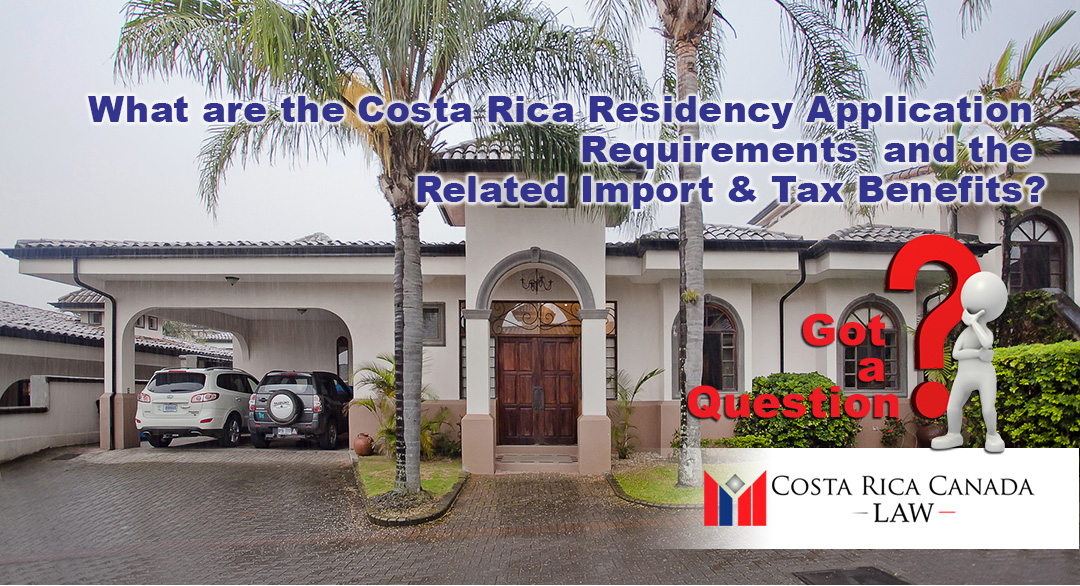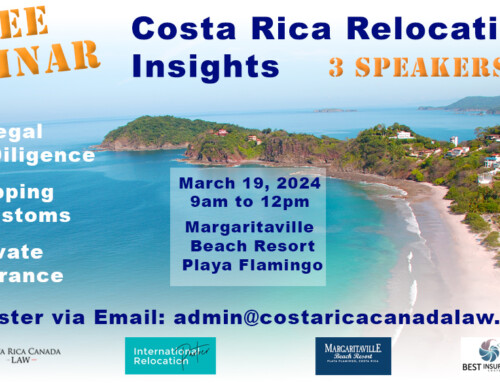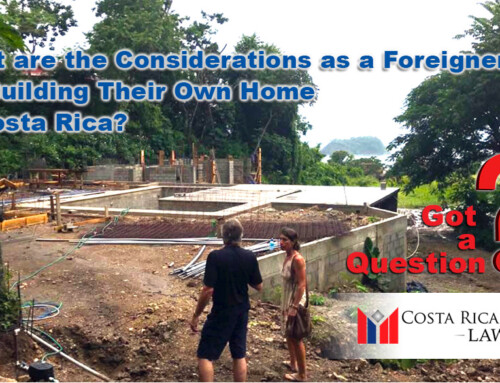In the month of February, 2023, significant changes were introduced by the Costa Rica Government to the application requirements for the Inversionista (Investor) Category for Temporary Residency. In addition, the long-awaited pronouncement of the Regulations for Costa Rica Law 9996, respecting the Temporary Residency Import Tax and associated tax relief benefits for applicants who are granted Temporary Residency, was announced. The following is a synopsis of these changes.
General Documentary Requirements
In general, similar documentary requirements apply to the supporting documentation required to be obtained from the applicant’s home jurisdiction for each of the three temporary residency categories. The distinguishing factor for the categories is the unique financial requirement that must be met for each category, which I will detail. The general supporting documentation required by temporary residency applicants includes an original Birth Registration Certificate, an original Police Report from a National Police Force based on fingerprints, and an original Marriage Registration Certificate if applicable. Each of these documents must be issued current by the issuing agency within six months of the residency application submission date to the Costa Rica Immigration Department.
If coming from the U.S., the original FBI Police Report must have the Apostille Seal affixed by the Office of the Federal Secretary of State and the other original documentation must have the Apostille Seal affixed by the Office of the Secretary of State where the document was issued. If coming from Canada, starting on January 11, 2024, Canada is adopting the Apostille document authentication process for Canadian documentation, to be utilized in foreign jurisdictions. All of the original documentation must be authenticated by way of an Apostille Seal affixed by either Global Affairs Canada, or by the competent authority for a Province so authorized, according the particulars contained on the Global Affairs Canada website: Global Affairs Canada>Authentication of Documents> Changes to Authentication Services in Canada. This will hopefully simplify the document authentication process for Canadians, as no longer requiring the legalization of the documentation at the Costa Rica Embassy in Ottawa. Applicants from other countries will have to meet the particular document authentication process required from their Country of Origin.
Registration confirmation with the Applicant’s home country embassy in San Jose, Costa Rica, providing Costa Rica contact particulars, and two passport-size face-on photos are also required. The Applicant must also be fingerprinted by the Costa Rica Police as a part of the Residency Application process and must join and pay into the Government Social/Medical Insurance Program, known as the CAJA.
Specific Financial Documentary Requirements
a) Pensionado (Pensioned) Residency
Pensionado Residency requires that the applicant show a lifetime pension income from a recognized pension source, such as Social Security, a disability pension, or a private annuity, of the equivalent of at least $1,000.00 U.S. per month, which also qualifies a legally married spouse as a dependent applicant. Original documentation respecting the pension income must be issued within six months of the residency application date and notarized if coming from a private source. Thereafter, the documentation must be authenticated in the applicable manner as previously explained and in accordance with the requirements associated with the applicant’s country of origin.
b) Rentista (Investment Income) Residency
Rentista Residency requires, pursuant to the published Regulations, that the applicant show an investment income of the equivalent of $2,500.00 U.S. per month, received in a permanent and stable, manner for a period of two years. Prior to the month of February, 2023, the common practice of applicants was to deposit the sum of $60,000.00 U.S. into a Costa Rica bank account and the applicable bank would certify that the stated financial requirement for the residency application was met, including for a legally married spouse and minor children to the age of eighteen, or children enrolled full time in a recognized educational institution. This, of course, is not an accurate statement, when the financial requirement is in-fact being met by a monthly return of the applicant’s deposit principal and is not being met by investment income.
In February 2023, the Costa Rica Government, in announcing the Temporary Residency Application changes, stated that the policy of allowing the “loop-hole” of depositing $60,000.00 U.S. into a Costa Rica bank account to meet the Rentista financial requirement, would no longer be accepted. Instead, the requirement would be that the investment income must be generated from a true invested amount of money, producing the required $2,500.00 U.S. monthly investment income amount, certified by a domestic or foreign main stream bank. Brokerage accounts would no longer be accepted. However, after a couple of months of “some obvious sober second thinking”, the Immigration Department issued a revised wording to the required Certified Bank Letter acknowledging the receipt by the Rentista Residency Applicant of the necessary investment income, which allows an applicant to continue to base the financial component of the Rentista Residency Application on a $60,000.00 U.S. Costa Rica bank deposit. This practice of receiving a $60,000.00 U.S. deposit is continuing with Costa Rica banks. This allows the Rentista Category of Residency to be open for Applications from a much greater number of applicants than it would have been, should the revised policy have been adopted.
c) Inversionista (Investor) Residency
This Inversionista Temporary Residency Category, has had the most diverse changes in the application requirements announced in February 2023. The qualifying investment amount by an Inversionista Residency Applicant is $150,000.00 U.S., also qualifying a legally married spouse and minor children to the age of eighteen, or children enrolled full time in a recognized educational institution to age twenty-five. The choice of the investment in Costa Rica is quite varied.
i) Personally Owned Real Property and Vehicles
In order to use real property that is not an income tax paying, active income earning source as the investment, the property must be registered in the National Registry in the Residency Applicant’s personal name, showing a Municipal Property Tax Assessment Value of at least the equivalent of $150,000.00 U.S. In the case of a married couple applying for Residency, the registered interest of the principal applicant as between the two spouses, must equate to $150,000.00 U.S., in the manner previously stated. This investment also qualifies minor children to the age of eighteen, or children enrolled full time in a recognized educational institution to age twenty-five. The real property investment amount may be supplemented by the value of the National Registry registered vehicle(s) in the principal applicant’s name, in order to meet the requirement.
ii) Company Shares
In order to base the Inversionista Residency Application on shares in a Costa Rica corporation, the corporation must be an active, income earning tax paying entity, registered with the Costa Rica Tax Department. The Share value of the applicant, or principal applicant in the case of a legally married couple, must have a registered share value certified by a Notary Public, or a share investment value certified by a Public Accountant of at least $150,000.00 U.S. The investment by the corporation may be a combination of real property and registered vehicles as previously described.
iii) Securities and Government Sponsored Investment Opportunities
There are varied investment opportunities in Costa Rica, all requiring minimum investment amounts by the Temporary Residency Applicant of $150,000.00 U.S., also, qualifying a legally married spouse and minor children to the age of eighteen. These investments include purchasing Securities or investing in Venture Capital, through a Costa Rica brokerage firm registered with the Regulatory Authority SUGEVAL, investment in projects declared to be of a National interest by the Costa Rica Government, and sustainable tourism infrastructure projects recognized by the Costa Rica Tourism Institute (ICT). In my opinion, these types of investment will not be considered by the majority of Inversionista Residency Applicants.
Import and Associated Tax Relief Benefits
Following the granting of Temporary Residency Status by the Costa Rica Immigration Department in one of the three categories of Pensionado, Rentista, or Inversionista, the successful Temporary Resident will have the benefit to receive a one-time importation of household effects duty free, along with an import tax exemption for the importation of two vehicles (land, sea, or air), for personal use, for a period of ten years prior to selling them in order to maintain the exemption along with meeting other associated conditions, a 20% discount for the Property Transfer Tax paid on the purchase of real property, and an exemption of the import duties for the importation of instruments or materials used by a Residency beneficiary for professional or scientific practice.
In order to proceed for a claim of these benefits, the Temporary Residency status holder will have to create an account in the online platform EXONET, with considerable reliance on the Shipper that they use for the importation process.
In all respects, I would advise the Costa Rica Temporary Residency Applicant to retain competent Legal Counsel, prior to undertaking the Application process.






